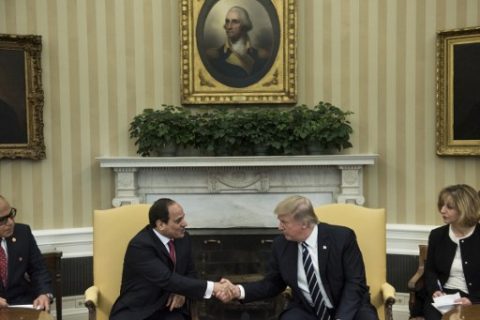
by Andrew BEATTY
WASHINGTON, United States (AFP) — United States President Donald Trump set human rights scandals aside to welcome Abdel Fattah al-Sisi to the White House Monday, the first such visit from an Egyptian president in almost a decade.
Greeting Sisi warmly in the Oval Office, Trump heaped praise on the former general’s leadership as he sought to mend ties strained by crackdowns, revolution and counter-revolution.
“You have a great friend and ally in the (US) and in me,” Trump told Sisi, sweeping aside his predecessor Barack Obama’s concerns about Sisi’s purge of political opponents and rights activists.
The meeting symbolizes the Egyptian leader coming in from the cold, after years of being kept at arm’s length by Washington.
Trump is betting that Egypt can be a partner in achieving two key goals: restarting the Middle East peace process and tackling jihadist groups.
“I just want to let everybody know that we are very much behind President al-Sisi — he has done a fantastic job in a very difficult situation,” Trump said.
The last time an Egyptian president was at the White House was in 2010, when Hosni Mubarak attended Middle East peace talks alongside Israeli, Palestinian and Jordanian leaders.
Within months, Mubarak was ousted by a popular uprising, as the Arab Spring swept across the region.
Obama had angered allies in Egypt’s powerful military by putting his finger on the scales, warning them against quashing protests by force.
In the months and years that followed, the Egypt-US relationship was strained further as a broadly Islamist and then a military government — led by Sisi — took charge.
Hundreds of demonstrators were killed and thousands jailed during the accompanying crackdown, prompting Obama to freeze military aid to Egypt — worth roughly a billion dollars a year.
Egypt’s pivotal regional role meant that aid was fully reinstated in 2015, but diplomatic relations remained difficult.
Common cause
The catalyst for Trump and Sisi’s friendship has been a common hardline stance against jihadist groups, which Sisi described as “a satanic ideology” during brief remarks at the White House.
The former New York property tycoon and the former Egyptian army general, who had no plans for a joint press conference, previously met in September when Trump’s campaign was still in full swing.
Trump at the time called Sisi a “fantastic guy.”
Sisi was reportedly the first to call Trump to offer his congratulations on his November election win.
In one of several public appearances, Trump gave only the slightest hint of areas of difference.
“We have many things in common, We have a few things that we don’t agree on,” he said. “I think that this is going to be a very productive day.”
Asked directly whether human rights were discussed, Trump declined to answer.
Ahead of the meeting, a senior administration official said the topic would be handled in a “private, more discreet way.”
“We believe it’s the most effective way to advance those issues to a favorable outcome.”
That stance was slammed by rights groups, who say tens of thousands of opponents have been arrested or are facing criminal charges.
“Inviting al-Sisi for an official visit to Washington as tens of thousands of Egyptians rot in jail and when torture is again the order of the day is a strange way to build a stable strategic relationship,” said Sarah Margon, Washington director of Human Rights Watch.
Egypt’s own watchdog said in a report last year that it raised 266 cases of enforced disappearances with the interior minister.
Making peace
The thorny issue of the Palestinian-Israeli peace process was also expected to be on the agenda.
Egypt and Jordan are the only two Arab states to have signed peace treaties with Israel and would likely be considered key players in any renewed peace effort.
Jordan’s King Abdullah will visit the White House on Wednesday, as Trump — a self-declared expert dealmaker — looks to make the deal of all deals.
A senior administration official described “very positive discussions” between the US and Egyptian leaders both on Middle East peace and fighting jihadists.
But experts warn that Sisi may be unable to deliver what Trump wants on either dossier.
“Sisi’s brutal repression has made Egypt a mass-production facility for violent extremism,” said Michele Dunne of the Carnegie Endowment for International Peace.
Meanwhile, she added, “Egypt’s leadership has become irrelevant to peace efforts in the region.”







